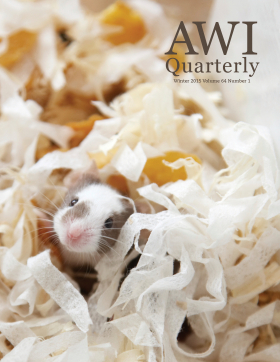
According to the latest “Annual Report Animal Usage by Fiscal Year” published by the US Department of Agriculture (USDA), 891,161 animals were used in research in 2013 in the United States. This figure does not include mice, rats, birds, cold-blooded animals, and farm animals used in agricultural research—none of whom are considered “animals” under the Animal Welfare Act (AWA). The number of mice and rats used may be 20 times that number. In the vast majority of cases, when the study ends, animals in research are euthanized. An ethical obligation exists to employ methods that ensure such animals are spared from suffering. Research protocols don’t always call for euthanasia, however. What happens then? AWI discusses a nascent but growing recognition by research institutions and affiliated professional organizations that animals who can be adopted out should be. More effort is needed to overcome obstacles and facilitate this process.